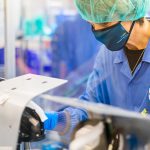Asian governments have decided that developing new and more medical device products will bring growth (and profits) to their countries and enhance their domestic healthcare systems. Thus, we now see many new Asian governments supporting medical device development in a number of areas. These new medical devices, supported by their governments, lead to additional competition for Western medtech manufacturers.
Below, we have outlined a number of the new technologies developed in some of the Asian countries and related government support.
Singapore
In 2012, the government of Singapore started heavily supporting startups and growing businesses with low interest loans and business training programs. SPRING Singapore, a statutory board under the Ministry of Trade and Industry, aims to develop Singaporean enterprises. SPRING Singapore offers startups investment through the government agency called Spring Seeds Capital. In July 2017, Spring Seeds Capital announced a $70 million commitment to invest in technology startups, including health and biomedical new businesses.
Singapore has also developed a number of biomedical infrastructural projects to support the growth of its biomedical startups. Singapore’s ‘Block 71’, a biomedical entrepreneurial complex developed by government agencies in 2011, currently houses more than 250 startups and is one of the densest startup hubs in the world.
For example, EndoMaster Medical, a Singapore startup founded in 2011, has developed a robot-assisted system to remove gastrointestinal tumors. EndoMaster’s system is used through endoscopy, eliminating the need for more invasive surgeries. The company has successfully completed animal trials for cancer removal in 2015 and has since successfully tested its system in human patients. EndoMaster Medical plans to launch the product in Europe in late 2018 and is estimated to have raised $15 million in capital.
In addition, Clearbridge Biomedics is another Singapore startup (founded in 2009) that develops medical devices for cancer diagnostics and patient care that isolate tumor cells from blood for diagnostics. Its main product, the ClearCell FX automated CTC retrieval system, has received CE certification in 2015, and the company has received around $7 million in funding to date.
Japan
Startups have historically been low in Japan due to little venture capital, the risk-averse nature of Japanese people, and the high costs to get started. However, the number of startups in Japan is rising quickly as the economy shifts away from traditional, long-term lifetime employment. Japanese Prime Minister Shinzo Abe supported this shift after visiting Silicon Valley in 2015, and created a program for Japanese startups to visit Silicon Valley for mentorship. In addition, Fukuoka city was approved to provide ‘Startup Visas’ for foreigners in 2016 and has earned the reputation as the “startup city” in Japan, joining Tokyo on the list of prime locations to establish a startup.
Cyfuse, a Japanese startup founded in 2010, develops a 3-D tissue fabrication system from cell-based materials. It is one of approximately 10 companies in the world in the bio-printing industry, and the only company to use the Kenzan Method, which involves applying microscopic needles to provide structure to the intended tissue. Currently, Cyfuse has raised around $12 million in capital, and its products are in research use in Japan, the United States and Canada.
Cykinso, another Japanese startup founded in 2014 with $2 million in capital, developed an at-home testing kit for intestinal flora called ‘Mykinso.’ After collecting a fecal sample and sending it back to Cykinso’s lab, the Mykinso kit provides users with information about their intestinal conditions, bacterial diversity, and suggestions for dietary improvements. The product is currently marketed in Japan and has only one major U.S. competitor, uBiome, Inc.
Taiwan
Taiwan offers many incentives for startups too, particularly in the form of matching grants. Grants can be as large as $3.3 million, but are usually in the $100,000–$160,000 range. Startups are required to match the investment offered by the government. Subsidies and loans are also widely available.
Health2Sync, a Taiwanese mHealth startup founded in 2013, developed a mobile app for the patient management of diabetes. The mobile app monitors and tracks a patient’s blood glucose level and relays the data to the patient’s care team. Health2Sync is expanding rapidly in the Asia-Pacific markets, and is available in English, Chinese and Japanese. Health2Sync has raised around $5 million in capital.
MaiSense, another Taiwanese startup founded in 2012 with $5 million in funding, developed the world’s first cuff-free blood pressure monitor called Freescan. The Freescan handheld monitor measures the pulse on the wrist, and produces a reading of stress levels, atrial fibrillation and arterial conditions. In 2015, MaiSense received CE approval for Freescan and also began sales in Switzerland.
China
In 2015, the Chinese government announced the “Made in China 2025” initiative, which aims to boost growth in the country’s high-tech and innovative sectors. The government has also proposed tax cuts for new businesses, and established a $30 billion venture capital fund to support startups. Several Chinese mHealth startups that connect patients with medical practitioners, such as WeDoctor and Ping An Good Doctor, founded in 2010 and 2015 respectively, have achieved valuations of more than $1 billion. Others such as AliHealth, a medical service mobile app founded in 2014, and BabyTree, an online parenting community founded in 2006, have received more than $500 million in funding.
InferVision, a Chinese startup founded in 2015, developed one of the world’s first AI-assisted CT diagnosis software that helps doctors with decisions on cancers and other diseases. Infervision’s product is already on the market in China and is currently being used in several top hospitals in the country. The startup has raised more than $7 million in capital.
Hong Kong
In 2015, Hong Kong was rated the fifth fastest growing startup ecosystem in the world, according to Compass, a San Francisco-based research firm. Hong Kong is very pro-business and has many entrepreneurs. Its government has supported this growth with a $230 million government investment fund and by implementing the “Technology Startup Support Scheme for Universities”.
For example, Prenetics, a Hong Kong startup founded in 2014 with $13 million in capital, produces a genomics testing kit that examines a number of health indicators for users. The kit, MyDNA, determines a user’s nutritional needs, cancer risks, reactions to pharmaceutical products and genetic disorders after collecting a sample of saliva. With existing offices in Hong Kong and Singapore, Prenetics has recently expanded into Indonesia in 2017 and hopes to become a top genomics competitor in the Asia-Pacific region.
India
In early 2016, the Indian government announced the “Startup India” initiative, which allocated a $1.5 billion fund and numerous tax breaks for startups and its investors. The government is also building more than 20 incubators where startups can receive training and guidance for their venture.
Forus Health, an Indian startup founded in 2010, produces an eye-scanning technology that screens for diseases that may lead to blindness. The startup’s portable ‘3nethra’ eye scanner has greatly reduced medical costs and increased medical accessibility in remote regions. Forus Health has received close to $15 million in funding and sells its products in 26 countries.
Spectral Insights, another Indian startup founded in 2016 with undisclosed funding, develops microscopes with hyperspectral imaging techniques. For example, its Vulcan Digital Pathology Imaging System allows pathologists to scan and share biopsy images. The technology used by Spectral Insights has greatly reduced costs for doctors in India, and has strong potential for market growth in the country.
Korea
The Korean government has partnered with the nation’s largest conglomerates to support the local startup scene with approximately $3.5 billion in funding. In addition, the South Korean Ministry of Science and several Seoul-based accelerators created the ‘K-Startup Grand Challenge’ program to boost promising startups. Focusing on innovations in biotech, the Ministry of Science has allotted a $100 million fund for young entrepreneurs who are developing new biotechnologies.
YBrain, a Korean startup founded in 2013, produces a wearable headband device that treats psychiatric and neurological disorders. The first-of-its-kind headband emits electronic signals that counter the symptoms of mild Alzheimer’s disease. The product also conducts direct current stimulation to treat depression. The startup has received over $4 million in funding and is in use in a number of South Korean hospitals.
Neofect, another Korean startup founded in 2010 with $5 million funding, developed the ‘Rapael Smart Glove’, a wearable device that helps patients with neurological and musculoskeletal injuries relearn movements. At as low as $100 per month, Neofect’s product is almost 10 times cheaper than competitor products, such as the Saebo (North Carolina) and Aider (Korea) gloves.
Conclusion
Western medtech companies can expect more new medtech technologies coming out of the Asian market going forward. Some of these Asian technologies will compete with existing Western products. Some Asian medtech companies and their products may be so attractive that Western medtech companies may look to acquire them.








